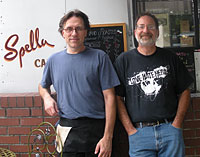
TIP: You can save products to
your favorites list if you log in
Fazenda São Felipe is located closeby the city of Franca, in the Alta Mogiana region. The farm is in the hands of Vanessa's family for several generations. A while back, Vanessa left the rural area for her studies, seeking a career in the city, however, returned to her family farm 5 years ago to be connected to nature and this reflects
in everything she does at the farm.
Vanessa does coffee agriculture with great passion and is a hands-on farmer. She is the 4th generation of coffee producers in her family and with her mother, she is leading all agricultural practices at the farm. She invests heavily in regenerative technologies and tries to find ways to implement good practices for a new sustainable
coffee culture. At the farm, they are planting trees every year and slowly bring back the diversity that used to be present on the land before intensively farmed with coffee. They want to recover as much areas as possible and reforest
piece by piece – focusing on springs and water bodies. In the fields, all inputs with negative impact are
decreased to a minimum and soil and plant health are actively restored. Vanessa is working with sustainable practices – not for marketing reasons – but because she believes that this is the right way to do coffee agriculture and she wants to inspire others.
This microlot is the varietal Catucai 2SL, and full natural process and dried on raised beds. Exceptional single origin espresso and a fantastic, full-bodied drip coffee as well.
The Mogiana region of Brazil is a small designation of coffee origin along the border between São Paulo and Minas Gerais states. The region has a long history of agriculture, mining and in more recently, cash-cropping. Waves of European settlers aggressively transformed large portions of Brazil's inland savannah over many generations of colonial development, beginning with sugar cane and then quickly favoring coffee as consumption grew across the global north. São Paulo state includes some of Brazil's oldest coffee history, with one of the country's first rail-to-port transportation pipelines serving the state's main coffee port of Santos—whose title would be the namesake grade of commercial coffee from Brazil for many years. Once a slave plantation economy, Brazil's coffee production underwent cycles of booms and busts with a bad reputation for quality among consumers during its industrialization period. In the past 30 years, however, Brazil has made clear to the global coffee industry that its history has led to what is now easily the planet's most modern coffee farming culture, with world-class agronomic research and post-harvest technology that accommodates huge scale, as well as exemplary farmworker labor protections and high minimum wages for pickers.
Despite the default impression of Brazil as being dominated by large, mechanized farms, still about half of the country's coffee farmers are small, family-managed operations who process at home and sell to local growers' organizations to earn their living. Smaller farms tend to be clustered in the more difficult landscapes for coffee efficiency—the ones that are steep and forested, difficult to access, or at higher elevations where the climate is more challenging for coffee to thrive.
FAF Coffees is a specialty exporter in Brazil founded by the Croce family. During their years spent struggling to revive the soils of their own family farm in the Mogiana region, the Croces connected with like-minded growers struggling as well to make farming viable for the next generation, with a strong focus on their immediate ecosystems—the watersheds and canopies that made the land worth living on—as well as quality, as means to economic independence and self-esteem. Over the years the Croce's network of farmers grew. FAF now exports coffee on behalf of 150 small and sustainable farms throughout the Mogiana region, and increasingly, other pockets of entrepreneurial small growers dedicated to the same combination of cup quality, environmental health, and community strength, exuberantly referred to in the FAF network as “total quality”.




